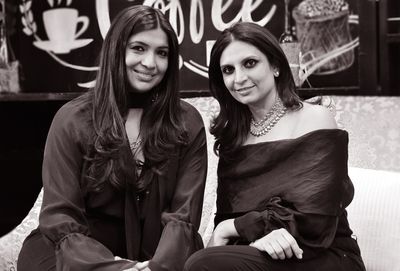I first wrote about Monica Shah and Karishma Swali—now known as “the Chanakya girls”—in 2019. I was completely fascinated by an embroidery school they had set up in Mumbai’s Byculla, formerly part of Girangaon or the textile mill hub that once built the city. The ladies together run The Chanakya School, which invites less privileged women from nearby areas to learn embroidery to upskill them and create employment opportunities.
The school’s building is an all-white modernist and air-conditioned space, much like a massive art gallery, with foldable designer chairs and an AV room. “Embroidery is a male-dominated field, but we wanted to bring more women to the workforce and thus empower them,” the ladies had told me then. Shah and Swali are sisters-in-law, and they worked for the successful embroidery house, Chanakya, that they inherited from Swali’s father and Shah’s father-in-law, Vinod Shah. Chanakya was among the chief embroidery hubs for various international labels like Gucci, Fendi, Giambattista Valli, Valentino, and most famously Dior.
Earlier this year, Dior hosted its first fashion show in India, at Gateway of India, as a tribute to their embroidery partners in Chanakya, highlighting the dependence of European couture on Indian embroideries and embroiderers. It was such a rare and transparent tribute to a partnership that has only and insufficiently been called ‘suppliers’ before this.
I have never seen someone rise with such swiftness and sincerity as the Chanakya girls have done with their effort. In four quick years, two of which were eaten up by the pandemic, Shah and Swali have become a force to reckon with in India’s fashion and retail space. The Dior partnership is moot to their ascent, but it is not the only reason.
In 2019, they ran one retail label—Jade By Monica and Karishma—and had one store in Mumbai’s Peddar Road. Jade now owns five stores across India (one each in Mumbai, Hyderabad and Bengaluru and two in Delhi) and is opening its sixth in Ahmedabad next month. It is an embroidery-first, ready-to-wear label that has quickly changed gears to become more premium. They have also upped their tailoring styles, besides offering Indian crafts such as brocade, kantha, lace, and contemporary batik prints. I visited the launch of their Bengaluru store last week; its walls were dressed with textile wallpaper especially woven in Barmer.
Swali and her teenage daughter Avantika launched Moonray in 2021. It is one of India’s most fun premium high-street labels, arguably its first if one is to exclude designers’ ready-to-wear labels. Moonray is a responsible fashion label that sources its materials keeping in mind their environmental impact. The cottons are organic and mostly rain-fed, the denims are raw and naturally dyed, the jersey is GOTS (Global Organic Textile Standard) certified, the viscose is certified, and the crochet is from recycled thread. It also uses vegan leather and upcycles leftover fabric swatches to make new clothes. Its design team includes LVMH prize winners Tina and Nikita Sutradhar, as well as craft specialist Renu Sahu. Moonray already has three stores across India, two in Mumbai and one in Delhi.
Most of the artisans employed by Jade and Moonray are from the Chanakya School itself. The Chanakya girls have taken India’s greatest resource—a longstanding tradition of excellent hand embroideries—and turned it into great enterprises. Yes, almost every bridal fashion designer does this too, but the Chanakya girls stand out on two important counts. Firstly, their focus is largely contemporary fashion, not ethnic or bridal wear. Secondly, and most important, their labels are focused as social enterprises where the hero(ine) is always the artisan.


